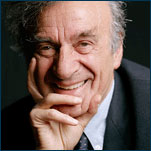Well, Penny went to brush her teeth so I can get to post also. And I have a big secret to share while she's in the bathroom. One flight up above my office, up that grand staircase, is the office of Elie Wiesel. That's a very important man, he was a Nobel peace prize laureate, which is one of the biggest awards a person get get on this whole wide planet. When Penny was working with Adam, I ran upstairs to see if I can finagle a meeting with Prof. Wiesel for Penny. He has a real nice secretary named also Jennifer, like my colleague. She said she will try her best to fit a meeting into his busy schedule. Penny is to show up at 9:30am on Tuesday (so early!). If we cannot get a picture with him, he will at least write a letter to sozlet. And we will get to see his office and take a photo there, with or without him. But don't tell Penny! It's a surprise! We have been talking about history a lot - about the war of Independence and also we talked a lot about conflict and how history can help overcome it. She will be very excited to meet Elie Wiesel in person, we talked a lot about him, too! If you'd like to know more about him, sozlet, here is a little bit written by a girl called Madison.
PEACEMAKER HERO:
ELIE WIESEL
by Madison from Alpine

Not many people know what a hero Elie Wiesel is, or even who he is, but he is a hero nonetheless. He was born in the small, close-knit Jewish town of Siget, Transylvania (now what is called Romania) on September 30, 1928. He had three siblings, all sisters, was raised an extremely religious Hasidic Jew, and started his studies when he was a small child. His parents encouraged him with his Hebrew and religious studies as well as his secular studies.
Elie's life changed tremendously in 1944, at the age of 15. At this time, the Nazis invaded his town and all of the Jews in the village were deported to concentration camps across Poland. He was separated from his mother and younger sister immediately and he has never seen them again. He managed to stay with his father for one year while they were worked nearly to death through starvation, exhaustion, cold weather with improper clothing, being shuttled in cattle cars, and being beaten regularly. But in the end, his father was murdered by the Nazis in Buchenwald. While living in France, years after his horrible experiences in Auschwitz, Bun, Buchenwald, and Gleiwitz, Elie learned that his two older sisters had survived.
In France, he studied philosophy and supported himself by becoming a choir master and teaching Hebrew. He also became a professional journalist. He did not talk about his war experiences for 10 years, and then he wrote a 900 page book called And the World Kept Silent).
Since then, he has written about 30 books and spoken out about the horrors of war. Wiesel has been honored with the Nobel Peace Prize, an appointment to the President's Commission on the Holocaust, the Congressional Gold Medal of Achievement, and much more. Elie Wiesel makes it clear that we cannot forget the Holocaust, and that he never will. He honors those who have died and makes sure that none of them will ever be forgotten. He expresses his feelings through these quotes
"The opposite of love is not hate, it's indifference. The opposite of art is not ugliness, it's indifference. The opposite of faith is not heresy, it's indifference. And the opposite of life is not death, it's indifference."